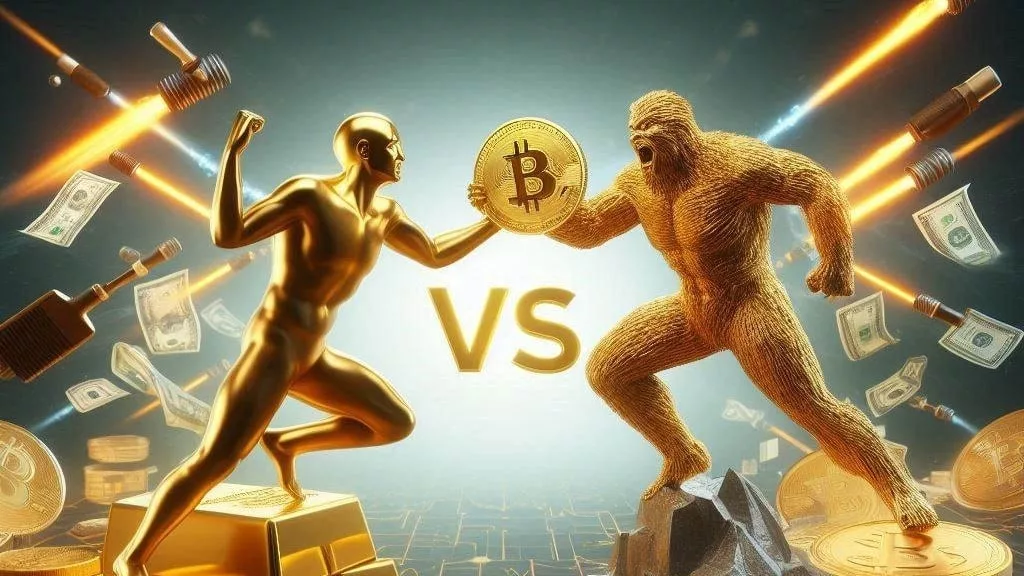
Renowned cryptocurrency advocate Jack Mallers and seasoned financial critic Peter Schiff squared off on the question of whether Bitcoin (BTC) or gold is the superior asset. The debate delves deep into the merits of both gold and digital gold (BTC) as potential world reserve assets and money.
Jack Mallers, CEO of Strike, strongly defended Bitcoin, arguing that it surpasses gold in several critical aspects. According to Mallers, Bitcoin’s fixed supply, high portability, and divisibility make it the “best money in human history.” He highlighted that over the past decade, Bitcoin has delivered an average annual return of 60%, a stark contrast to gold’s 2% return over the same period.
“BTC is the best money in human history,” Mallers proclaimed. “It’s the scarcest with a fixed supply, most portable, and most divisible. It has proven itself as a lucrative investment compared to gold.”
Mallers also emphasized that Bitcoin’s technological advancements and decentralized nature provide it with a significant edge over traditional assets like gold. He forecasted that Bitcoin could potentially reach between $250,000 and $1 million within the next 12 to 18 months, driven by liquidity inflows and its superior technology.
Peter Schiff, a staunch gold proponent and critic of cryptocurrencies, presented a different viewpoint. Schiff questioned Bitcoin’s suitability as money, arguing that it lacks the intrinsic value and marketability required of a true monetary standard.
“I don’t think BTC qualifies as money,” Schiff stated. “Money must be the most marketable commodity and have inherent value. Bitcoin lacks these characteristics. It is primarily used for speculation and not as money in the traditional sense.”
While acknowledging Bitcoin’s impressive performance over the past decade, Schiff suggested that gold, particularly in its tokenized form, could serve as a better alternative for a digital monetary system. He argued that tokenized gold could be transferred globally more efficiently and cost-effectively than Bitcoin.
“We could use gold as the basis of a digital monetary system,” Schiff argued. “It’s a more reliable and stable foundation compared to Bitcoin.”
Mallers countered Schiff’s arguments by pointing out the limitations of gold, particularly its reliance on centralized intermediaries for transactions. He argued that this reliance hampers gold’s scalability in a global economy and has contributed to its demonetization.
According to Mallers, the centralized nature of gold transactions limits its potential as a global reserve currency. He suggested that if gold were a viable competitor, Bitcoin adoption would have been slower.
Mallers also highlighted the technological and scalability advantages of Bitcoin, which he believes position it as a superior alternative to gold in the context of modern financial systems.
The debate also touched on the current market performance of both assets. At the time of writing, Bitcoin is ranked as the 10th largest asset by market capitalization, with a value of approximately $1 trillion. In contrast, gold remains the largest asset class with a market cap of nearly $17 trillion.
Despite Bitcoin’s recent struggles to break out of the $50,000-$60,000 range, Mallers remains optimistic about its future performance. He cited bullish patterns and potential for significant appreciation, especially if Bitcoin continues to gain traction as a digital asset.
Schiff, on the other hand, cautioned against speculative investments in Bitcoin, suggesting that there are other assets with less downside risk. He noted that gold investors have seen substantial gains compared to Bitcoin ETFs during recent market fluctuations.
From a long-term perspective, both assets have their proponents and critics. Peter Brandt, another notable figure in the trading community, highlighted a bullish pattern in the BTC/GLD ratio chart, suggesting that Bitcoin could potentially rally by 123% relative to gold.
As the debate between Bitcoin and gold continues, it’s clear that both assets offer unique advantages and challenges. Bitcoin’s technological innovation and potential for high returns make it a compelling choice for some investors, while gold’s stability and intrinsic value continue to attract those who prefer traditional assets.
The ongoing debate between Bitcoin and gold reflects broader discussions about the future of money and investments. While Jack Mallers argues for Bitcoin’s superiority based on its technological features and high returns, Peter Schiff defends gold’s timeless value and reliability as a monetary standard.
As the financial landscape evolves, investors must weigh the benefits and drawbacks of each asset, considering their individual goals and risk tolerance. Whether Bitcoin or gold emerges as the dominant asset will depend on how these factors play out in the coming years.


Get the latest Crypto & Blockchain News in your inbox.